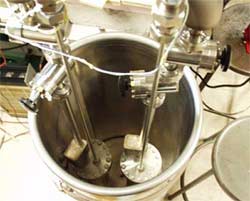Yoshiaki Arata, a retired physics professor at Osaka University performed a demonstration that could prove to be a breakthrough in the field of cold fusion.
With his co-researcher Yue-Chang Zhang, Arata uses pressure to force deuterium (D) gas into an evacuated cell containing a sample of palladium dispersed in zirconium oxide (ZrO2–Pd). He claims the deuterium is absorbed by the sample in large amounts — producing what he calls dense or "pynco" deuterium — so that the deuterium nuclei become close enough together to fuse.
"Arata's demonstration...was successfully done. There came about 60 people from universities and companies in Japan and few foreign people. Six major newspapers and two TV [stations] (Asahi, Nikkei, Mainichi, NHK, et al.) were there...Demonstrated live data looked just similar to the data they reported in [the] papers...This showed the method highly reproducible. Arata's lecture and Q&A were also attractive and active."
Jed Rothwell, who is editor of the US site LENR (Low Energy Nuclear Reactions) and who has long thought that cold-fusion research shows promise, said that after Arata had started the injection of gas, the temperature rose to about 70 °C, which according to Arata was due to both chemical and nuclear reactions. When the gas was shut off, the temperature in the centre of the cell remained significantly warmer than the cell wall for 50 hours. This, according to Arata, was due solely to nuclear fusion.
Rothwell also pointed out that Arata performed three other control experiments: hydrogen with the ZrO2–Pd sample (no lasting heat); deuterium with no ZrO2–Pd sample (no heating at all); and hydrogen with no ZrO2–Pd sample (again, no heating). Nevertheless, Rothwell added that Arata neglected to mention certain details, such as the method of calibration. "His lecture was very difficult to follow, even for native speakers, so I may have overlooked something," he wrote.
It will be interesting to see what other scientists think of Arata's demonstration. Last week Augustin McEvoy, a retired condensed-matter physicist who has studied Arata's previous cold-fusion experiments in detail said that he has found "no conclusive evidence of excess heat" before, though he would like to know how this demonstration turned out.

